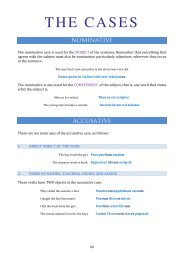Microsoft Word – FGB§2 verbs
Microsoft Word – FGB§2 verbs
Microsoft Word – FGB§2 verbs
Create successful ePaper yourself
Turn your PDF publications into a flip-book with our unique Google optimized e-Paper software.
e.g. On a entré le piano par la fenêtre They brought the piano in through the window<br />
Il a sorti son pistolet He got out his gun<br />
Nous avons rentré les chaises We’ve brought the chairs back in<br />
Le matador a tombé le taureau The matador brought the bull down<br />
Some <strong>verbs</strong> are conjugated with either avoir or être, depending on their meaning:<br />
avoir: for an action which took place at a certain point in the past;<br />
être: for a present state resulting from a previous action.<br />
e.g. On a augmenté les impôts They raised the taxes<br />
Les impôts sont augmentés The taxes have been raised<br />
J’ai passé devant l’église I walked past the church<br />
Ces jours sont passés These days are past<br />
The following are the most common <strong>verbs</strong> used in this way:<br />
accroître apparaître atterrir augmenter baisser camper<br />
cesser changer chavirer crever croître crouler<br />
décroître dégeler déménager diminuer disparaître échapper<br />
échouer embellir empirer expier grandir grossir<br />
maigrir paraître passer pourrir résulter ressusciter<br />
sonner trépasser vieillir<br />
Note also convenir. When it means ‘to suit’ or ‘to be suitable’ it takes avoir:<br />
Cette décision m’a convenu This decision suited me<br />
When it means ‘to agree’ it takes être:<br />
Ils sont convenus de passer un an en France They agreed to spend a year in France.



